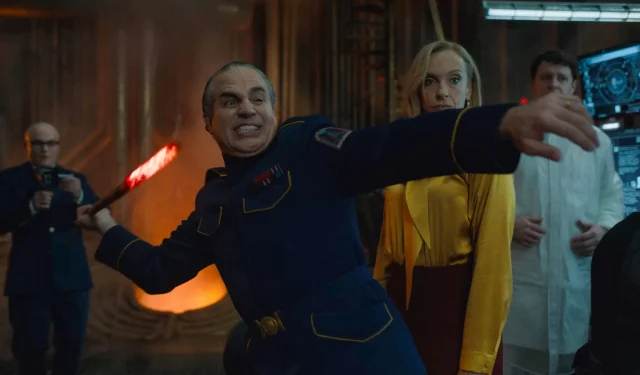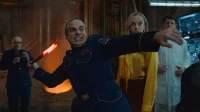The following contains spoilers for Mickey 17, now playing in theaters.
Exploring the Antagonist in Mickey 17
In the film Mickey 17, the main antagonist, Kenneth Marshall, draws notable comparisons to former U.S. President Donald Trump, a detail that underscores the character’s effectiveness as one of Bong Joon Ho’s most compelling villains to date. The narrative primarily follows Mickey, an unfortunate laborer in the attempt to create a space colony, who experiences frequent deaths only to be resurrected as a clone. While Mickey’s cycle of death and rebirth serves as the foundation of the plot, the film’s true strength lies in its sharp social commentary and satirical exploration of contemporary issues.
The character of Kenneth Marshall serves as a critique of political leaders, depicting a figure who, despite subjecting his followers to perilous circumstances on a distant planet, retains a devoted following. Marshall is intentionally designed to be a universal caricature of leaders who misuse their power, with certain traits that distinctly evoke the persona of Trump. This dynamic enhances the film’s climactic resolution, amplifying its thematic impact.
Mickey 17’s Villain Represents a Broader Commentary
A Universal Archetype Rather Than a Direct Parody
Even though Kenneth Marshall bears similarities to Donald Trump, Bong Joon Ho intended the character to reflect a combination of various political figures. According to reports from Screen Rant, the character’s design was less about any single individual and more about allowing viewers from multiple nations to see their leaders in his portrayal. This approach highlights universal flaws often seen in authoritarian figures.
This broad character design avoids the pitfalls of being overly specific, contributing to Marshall’s depth. His media-savvy tactics to maintain an image with the public echo how Trump leveraged television fame before his political career. Additionally, Marshall sports uniforms reminiscent of historical political figures who sought to project strength through militaristic fashion. His erratic personality and conspicuous need for admiration resonate with many politicians, making Marshall a universal symbol.
Mark Ruffalo’s Performance Amplifies the Parody
A Performance Rich with Trumpian Nuances
Mark Ruffalo’s portrayal of Kenneth Marshall enhances the parallels to Donald Trump. Ruffalo infuses Marshall with traits that mirror Trump’s public persona, such as an idiosyncratic speech pattern and expressive hand gestures. This deliberate choice enhances the character’s relatability while drawing on recognizable political theatrics, particularly regarding media manipulation and message control.
Moreover, the storyline involves Marshall’s political failures leading him to space, and Ruffalo plays this aspect for comedic effect, inviting comparisons with Trump’s reluctance to accept defeat in the 2020 elections. His attempts to outshine public disapproval echo the bombastic publicity campaigns often associated with Trump’s presidency. This intentional connection seems to reflect Ruffalo’s historical critiques of Trump, showcasing a layered approach to the character.
A Microscopic Examination of Societal Satire in Bong Joon Ho’s Work
Continuing a Legacy of Satirical Storytelling
Marshall fits well within the recurring theme of Bong Joon Ho’s films, which frequently depict the wealthy and politicians as central antagonists. Whether it’s the monstrous beings in The Host or the corporate machinations in Okja, the true foes are often powerful entities exploiting vulnerable populations. Similar to Snowpiercer, where the elite thrive while the less fortunate struggle, Mickey 17 confronts the nature of power and its repercussions.
In contrast to the sharp focus in Parasite, Marshall’s role serves as a more generalized critique of global leadership, providing the film with a broader scope of satire that resonates with audiences around the world.
The Impact of Marshall’s Similarities with Trump
A Hybrid of Notable Figures
Kenneth Marshall embodies a unique blend of Donald Trump’s attributes alongside the charismatic yet controversial traits of figures like L. Ron Hubbard. This allows the narrative of Mickey 17 to crunch the potential for societal advancement into self-serving leadership. Marshall’s repression of the lower classes ignites a fervent, cult-like support reminiscent of Trump’s MAGA movement, despite his controversial governance.
As noted by Deadline, Mark Ruffalo acknowledges that his portrayal of Marshall doesn’t aim merely to reference Trump directly but rather to embody the essence of a petty tyrant amidst current events.
With the political climate influenced by Trump during the film’s release, the resemblance between Marshall and Trump becomes an unavoidable narrative thread. The film serves as a cautionary tale about unchecked leadership, illustrating the dire consequences for the masses who suffer under tyranny until they decide to reclaim their voice. Kenneth Marshall plays a pivotal role in this moral narrative, crafting a satire that transcends specific figures while hinting at the dangers posed by contemporary political leaders.
By deliberately modeling Marshall to reflect more than just a single figure, Bong Joon Ho allows for a more expansive critique, yet Ruffalo’s interpretation channels Trump in ways that align with the contemporary political landscape, ensuring Mickey 17 remains relevant and impactful.
Sources: Screen Rant, Deadline


